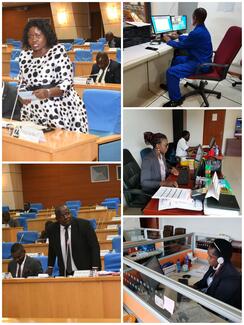- ImpactWe help parliaments to become greener and to implement the Paris agreement.We support democracy by strengthening parliamentsWe work to increase women’s representation in parliament and empower women MPs.We defend the human rights of parliamentarians and help them uphold the rights of all.We help parliaments fight terrorism, cyber warfare and the proliferation of weapons of mass destruction.We encourage youth participation in parliaments and empower young MPs.We support parliaments in implementing the SDGs with a particular focus on health and climate change.
- ParliamentsNearly every country in the world has some form of parliament. Parliamentary systems fall into two categories: bicameral and unicameral. Out of 190 national parliaments in the world, 78 are bicameral (156 chambers) and 112 are unicameral, making a total of 268 chambers of parliament with some 44,000 members of parliament. IPU membership is made up of 180 national parliaments
Find a national parliament
We help strengthen parliaments to make them more representative and effective. - EventsVirtual eventThe International Court of Justice (ICJ) was constituted under the United Nations Charter to help nations settle disputes peacefully in accordance with international law.
- Knowledge
Discover the IPU's resources
Our library of essential resources for parliamentsGlobal data for and about national parliamentsLatest data and reports about women in parliamentResolutions, declarations and outcomes adopted by IPU MembersRecent innovations in the way parliaments workThe latest climate change legislation from the London School of Economics' database
Digital transformation of parliamentary reporting at the National Assembly of Malawi

Digital Hansard production: from the Plenary Hall, to Audio Visual production, to Hansard transcribers. Image credit: Parliament of Malawi
The National Assembly of Malawi has recently modernized its parliamentary reporting processes by introducing new digital tools and methods to record and produce transcripts of plenary proceedings. As a result, the parliament is now able to publish its Hansard reports much more quickly – in a matter of days as opposed to weeks – and in digital format, making the distribution of these reports to members and the public virtually instantaneous.
This change marks a dramatic shift away from the previous cumbersome, manual process of producing Hansard reports. In the past, following a plenary meeting, the team of parliamentary reporters would manually transcribe the proceedings from boxes of analogue cassette tapes. Besides the lengthy production timelines, the scarcity of tapes on the local market posed another growing challenge, leaving the reporters with no choice but to erase and reuse old tapes, thereby destroying valuable archive material as well as risking the degradation and eventual failure of the media.
Under the new system, which was successfully trialled at the end of the last parliamentary term and is now the de facto method for producing the Hansard in the upcoming term, digital audio from plenary proceedings is automatically stored and distributed to the pool of parliamentary reporters, who are available during the live sessions. Reporters have also been provided with upgraded PCs, transcribers’ foot pedals and headsets. At the end of the “pooled transcription” process, the system automatically merges all text segments into a complete digital draft of the Hansard, ready for digital distribution and review by members prior to web publication.
The project, supported by UNDP Malawi, was part of the National Assembly’s new digital transformation strategy, which includes plans for a new public website (following the IPU guidelines for parliamentary websites) and the upgrading of chamber technologies to factor in members’ increased mobility. The National Assembly also learned from other parliaments of a similar scale and readiness – especially the Parliament of Fiji, which shared information about its own systems through the IPU’s Centre for Innovation in Parliament (CIP).
—
For this article, the CIP team spoke with Mr. Thomas Taimu, Chief Systems Analyst in the ICT Division of the National Assembly of Malawi.




